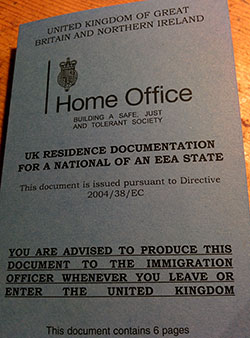I haven’t blogged/written much about politics here, mostly keeping it to G+ (which is now closing down). With Brexit going into overdrive at the moment and the final days before the deadline stumbling from crisis to crisis I’ve decided to start sharing the occasional thought on this blog as well. While many other EU citizens (incl several of my friends) have decided to leave the UK I have no plans to leave even though I’m very worried about Brexit and its impact on the economy and more. And while I haven’t made as much progress as I had hoped I’m still planning to obtain British citizenship. More about these two topics in another post, for this post I’d like to focus on a sentiment I’ve heard from both politicians and the general population increasingly often over the last few weeks: “I just want Brexit to be done and over with and get on with my life”:
I’m afraid you’re in for a very very rude awakening. Brexit hasn’t even started yet. Yes, you read that correctly. All we’ve had so far was the warming up phase.
Despite all the talk about a “deal/no deal Brexit” no deal has been negotiated yet. What is currently being discussed is the “Withdrawal Agreement (WA)” to agree the terms under which the UK leaves the EU (originally scheduled for 29/Mar/2019, but depending on developments that might be pushed out). We’ve all seen how difficult that has turned out to be with the various parties and fractions within the parties in the UK hugely divided about what they want, what is acceptable to them, what isn’t acceptable to them, who they could blame for not getting what they want, you name it. But all that was pretty much just about the WA (yes, there was some talk about red lines and the future relationship as well as declarations about intentions, but nothing legally binding in regards to the future relationship).
Negotiations about the future relationship with the EU, the trade deal with the EU, haven’t even started yet. And this future relationship will be even more difficult, even more controversial than the WA. Some want a quite close relationship with the EU, some as little as possible to do with the EU and others various shades inbetween. And none of them will be willing to compromise, same as now with the WA. Oh, and those kind of negotiations usually take many years. While the transition phase following the WA is set for 2 years (ish) it’s much more likely that negotiating a UK/EU trade deal will take a minimum of 5 years, quite possibly closer to 10 years.
Then there are all the other trade deals the UK will have to negotiate as it won’t be able to benefit from the dozens and dozens of trade deals it currently benefits from through EU membership. While some might be temporarily rolled over the majority will need to be renegotiated. And that will be tough, very tough. To start with the UK will have a significantly reduced negotiation power, for the simple reason that the UK is quite small compared to the still huge EU. Meaning the countries the UK will be negotiating with will demand much bigger concessions than what they were able to demand from the EU. And another important point: The whole world was able to watch how the UK was behaving during the WA negotiations with the EU, including public discussions/statements by UK politicians how the UK could escape (or better wiggle out of) the agreements the UK had just made with the EU. Having watched this no country negotiating with the UK will have much trust in anything the UK agrees to and they will be very wary about any promises made by the UK. Oh, and of course similar to the negotiations with the EU these negotiations will take many years.
There will also be a rude awakening for anyone believing into the “Taking back control of our laws” claims and slogans. The UK will turn from a rule maker and influencer (as a large member of the EU) into a rule taker. How? Simple: There are three large trading areas in the world (China, the US and the EU), as a smaller player (which the UK will be) you either follow their rules or you don’t trade. Your products and services either follow their rules or you can’t sell them. Neither to the big three or to almost all other countries as they will have mostly modelled their rules on the big three. The UK could of course have lower standards (in order to reduce bureaucracy/red tape), but that won’t help the UK exporters. Now the UK could of course introduce higher standards, but that would be the exact opposite of what the Brexiteers were promising, reducing restrictions (remember their outrage about the EU restricting the wattage of vacuum cleaners?) and removing “red tape”. Discussions about this topic will rage for many years.
Should there be a Crash Brexit (formerly known as cuddly “No Deal Brexit”) the impact will be even bigger and almost certainly felt even longer. Companies will implement their contingency plans (if they haven’t already done so) and a lot of business (and likely with it jobs) will leave the UK, some sooner, some later. There’s a very good chance there will be shortages in certain foods, medicines and possibly other things.
Not to mention the blame game depending on how badly Brexit goes wrong. That will run for probably the next decade. At least.
Or to summarise all the above, if you think Brexit will disappear from the news any time soon once the dirty deed is done you are dead wrong. On the contrary, it will only get worse.

